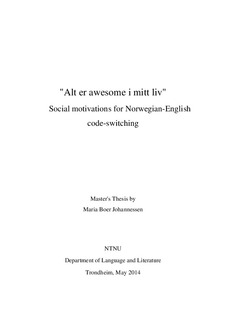| dc.description.abstract | This thesis examines which factors influence the use of English code-switching (CS) by Norwegians, and in the course of this examination, discusses what the social motivations are for such behaviour. The theoretical approaches of, among others, Myers-Scotton (1993), Auer (1984), and Le Page and Tabouret-Keller (1985), provide an overview of the main sociolinguistic perspectives on CS. These have formed a wide theoretical backdrop for this study, which helped facilitate the analyses and discussions of its results. Eight informants, divided into two groups, were observed for and asked about language behaviour and attitudes. The first group consisted of four informants of mixed educational and vocational backgrounds, while the second group's four informants are all students of English. Conducting both group and individual interviews, in which the informants were encouraged to speak as freely as possible, made it was possible to provide both quantitative and qualitative analyses of these informants' CS patterns. The quantitative analysis shows that the mixed group mostly had simple single-word switches, while the English group had significantly more switches, which were generally also more complex. Both groups predominantly used CS within Norwegian sentences, and there were few instances of CS between whole sentences. The qualitative analysis revealed that both groups often mark their use of English elements, either by flagging words by preceding discourse markers such as sånn and eh, or by using exaggerated accents and other indications of reported speech. The results indicate that one of the main motivations for code-switching between Norwegian and English is to optimize clear and meaning-specific communication between participants in a conversation. A second motivation is to identify with and express personal or cultural belonging to specific social and/or linguistic groups, which may or may not be present in that conversation. Factors which may influence such motivations are the interlocutors in the conversation and the relationships between them, as well as the speakers' proficiency in each language and how this influences their language repertoires. | nb_NO |
